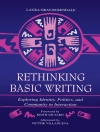The second, thoroughly revised and expanded, edition of The SAGE Handbook of Visual Research Methods presents a wide-ranging exploration and overview of the field today. As in its first edition, the Handbook does not aim to present a consistent view or voice, but rather to exemplify diversity and contradictions in perspectives and techniques.
The selection of chapters from the first edition have been fully updated to reflect current developments. New chapters to the second edition cover key topics including picture-sorting techniques, creative methods using artefacts, visual framing analysis, therapeutic uses of images, and various emerging digital technologies and online practices. At the core of all contributions are theoretical and methodological debates about the meanings and study of the visual, presented in vibrant accounts of research design, analytical techniques, fieldwork encounters and data presentation.
This handbook presents a unique survey of the discipline that will be essential reading for scholars and students across the social and behavioural sciences, arts and humanities, and far beyond these disciplinary boundaries.
The Handbook is organized into seven main sections:
PART 1: FRAMING THE FIELD OF VISUAL RESEARCH
PART 2: VISUAL AND SPATIAL DATA PRODUCTION METHODS AND TECHNOLOGIES
PART 3: PARTICIPATORY AND SUBJECT-CENTERED APPROACHES
PART 4: ANALYTICAL FRAMEWORKS AND PERSPECTIVES
PART 5: MULTIMODAL AND MULTISENSORIAL RESEARCH
PART 6: RESEARCHING ONLINE PRACTICES
PART 7: COMMUNICATING THE VISUAL: FORMATS AND CONCERNS
Table of Content
Chapter 1: Visual Dialogues across Different Schools of Thought – Luc Pauwels and Dawn Mannay
PART 1: FRAMING THE FIELD OF VISUAL RESEARCH
Chapter 2: An Integrated Conceptual and Methodological Framework for the Visual Study of Culture and Society – Luc Pauwels
Chapter 3: Looking Two Ways: Mapping the Social Scientific Study of Visual Culture – Richard Chalfen
Chapter 4: Visual Studies and Empirical Social Inquiry – Jon Wagner
Chapter 5: Seeing Things: Visual Research and Material Culture – Jon Wagner
PART 2: VISUAL AND SPATIAL DATA PRODUCTION METHODS AND TECHNOLOGIES
Chapter 6: Rephotography for Documenting Social Change – Jon H. Rieger
Chapter 7: Repeat Photography in Landscape Research – Mark Klett
Chapter 8: Videography: An Interpretative Approach to Video-Recorded Micro-Social Interaction – Hubert Knoblauch and René Tuma
Chapter 9: Eye-Tracking as a Method of Visual Research – Clare Kirtley
Chapter 10: Expanding Cartographic Practices in the Social Sciences – Innisfree Mc Kinnon and Jessica Mc Callum Breen
Chapter 11: Participatory Geographic Information Systems in Visual Research – Wen Lin
Chapter 12: Visualization in Social Analysis – John Grady
Chapter 13: Visual Research Methods in the Design Process – Prasad Boradkar and Tejas Dhadphale
PART 3: PARTICIPATORY AND SUBJECT-CENTERED APPROACHES
Chapter 14: Methodological Variation in Participant Visual Media Production – Richard Chalfen
Chapter 15: Community-Based Participatory Video and Social Action – Claudia Mitchell and Naydene de Lange
Chapter 16: Digital Storytelling as a Research Method – Sarah Flicker and Katie Mac Entee
Chapter 17: Photovoice: A Critical Introduction – E-J Milne and Rachel Muir
Chapter 18: Using Drawing in Visual Research: Materializing the Invisible – Philippa Lyon
Chapter 19: Picture-sorting Techniques: Card Sorting and Q-sort as Alternative and Complementary Approaches in Visual Social Research – Katharina Lobinger and Cornelia Brantner
Chapter 20: Artefacts, Third Objects, Sandboxing and Figurines in the Doll’s House – Dawn Mannay
Chapter 21: The Therapeutic Use of Photography: Phototherapy and Therapeutic – Del Loewenthal
PART 4: ANALYTICAL FRAMEWORKS AND PERSPECTIVES
Chapter 22: Quantitative Content Analysis of the Visual – Katy Parry
Chapter 23: Visual Semiotics: Key Concepts and New Directions – Giorgia Aiello
Chapter 24: Advances in Visual Rhetorical Analysis – Laurie Gries
Chapter 25: Iconology and Documentary Method in the Interpretation of Divergent Types of Visual Materials – Ralf Bohnsack
Chapter 26: Ethnomethodology and the Visual: Practices of Looking, Visualization, and Embodied Action – Michael Ball and Gregory Smith
Chapter 27: Methodological Approaches to Disclosing Historic Photographs – Eric Margolis and Jeremy Rowe
Chapter 28: Researching Film and History: Sources, Methods, Approaches – James Chapman
PART 5: MULTIMODAL AND MULTISENSORIAL RESEARCH
Chapter 29: Multimodality and Multimodal Research – Theo van Leeuwen
Chapter 30: Visual and Multimodal Framing Analysis – Renée Moernaut, Jelle Mast and Luc Pauwels
Chapter 31: Multimodal Critical Discourse Analysis: how to reveal discourses of health and ethics in food packaging – Per Ledin and David Machin
Chapter 32: How to ‘Read’ Images with Texts: The Graphic Novel Case – Jan Baetens and Steven Surdiacourt
Chapter 33: A Multisensory Approach to Visual Methods – Sarah Pink
Chapter 34: Rapid Prototyping for Social Science Research – Carey Jewitt, Kerstin Leder Mackley, Douglas Atkinson and Sara Price
PART 6: RESEARCHING ONLINE PRACTICES
Chapter 35: A Multimodal Model for Exploring the Material Culture of Digital Networked Platforms and their Practices – Luc Pauwels
Chapter 36: Contemporary Landscapes of Visual and Digital Communication: The Interplay of Social, Semiotic, and Technological Change – Clarice Gualberto and Gunther Kress
Chapter 37: Understanding Online Images: Content, Context and Circulation as Analytical Foci – Helen Lomax and Janet Fink
Chapter 38: Visual and Affective Analysis of Social Media – Kate Marston
PART 7: COMMUNICATING THE VISUAL: FORMATS AND CONCERNS
Chapter 39: Creating Visual Essays: Narrative and Thematic Approaches – Terence Heng
Chapter 40: Anthropological Filmmaking: An Empirical Art – David Mac Dougall
Chapter 41: Visual Ethnography and Emerging Digital Technologies – Paolo, S. H. Favero
Chapter 42: Revisualizing Data: Engagement, Impact and Multimodal Dissemination – Dawn Mannay
Chapter 43: Making Arguments with Images: Visual Scholarship and Academic Publishing – Darren Newbury
Chapter 44: Visual Ethics beyond the Crossroads – Andrew Clark
Chapter 45: Legal Issues of Using Images in Research – Jeremy Rowe
About the author
Dawn Mannay is a Senior Lecturer in Social Sciences (Psychology) at Cardiff University. Her research interests revolve around class, education, families, identity, and inequality. Dawn employs participatory and visual methods in her work with communities, and she has facilitated a number of international creative methods workshops. Dawn was the principal investigator on a study exploring the education of care-experienced children and young people, and she is currently involved in a project for the Welsh Government, facilitating the online community of practice—Ex Change: Care and Education. Dawn edited a collection for the University Wales Press, Our Changing Land: Revisiting Gender, Class and Identity in Contemporary Wales (2016) and wrote the sole authored text for Routledge, Visual, Narrative and Creative Research Methods: Application, Reflection and Ethics (2016). Her most recent work, Emotion and the Researcher: Sites, Subjectivities and Relationships, coedited with Dr. Tracey Loughran, was published by Emerald in 2018.












